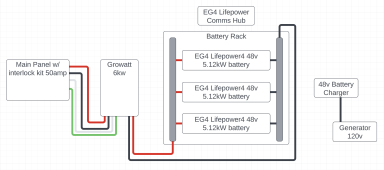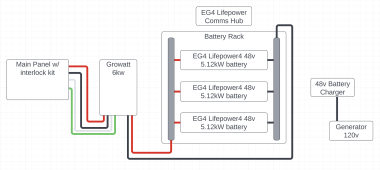rpatel18
New Member
Brief Context: We're expecting our first child in December and one of things I've started to get worried about is the power outages in our area, Menlo Park, CA. This past winter, we had some pretty bad rain and wind storms where we lost power 3 times and it took about 30hrs for the power to come back on each time. I've been bouncing back and forth over a gas generator or a battery backup and I think I'm leaning towards a battery system now. One of the main reasons is the power outages are usually happening during a really bad rain storm with high winds and I don't feel comfortable running a generator overnight even though It'd be in a generator tent. I'm thinking if I got a battery system and rack mounted it, I could keep it in the garage.
I've had a Emporia Vue installed since December to monitor our energy use... with the data collected, I've seen that the house will pull a max ~3000watts/~25amps w/ the heat running (heat pump), lights on, fridge running, and tv running (this included home theater system). On average, it's pulling about ~1500watts/~15amps. Obviously we'd wouldn't be watching TV and using minimal light as the key is the keep the heat on and the fridge running. Since the heat is on 240v, I'll need some sort of split phase system I think?
I was looking at possibly getting one of those all in one systems like 2 Ecoflow Delta Pros and connecting them to a generator interlock so I can manually switch it to a battery system, but all of the systems I've seen (Bluetti, Ecoflow) can only provide 30amps of power at 240v and fairly lower wattage output too.
I recently started to look into a DIY setup and was wondering if I could accomplish the same as one of these prebuilt systems provide but for cheaper and provide 50amps of output and higher wattage? 2 inverters and some batteries to create a battery backup system that could wire into a 50amp interlock breaker into my main panel. What I don't know or I have question are a few things:
thanks in advance to tips and thoughts!
I've had a Emporia Vue installed since December to monitor our energy use... with the data collected, I've seen that the house will pull a max ~3000watts/~25amps w/ the heat running (heat pump), lights on, fridge running, and tv running (this included home theater system). On average, it's pulling about ~1500watts/~15amps. Obviously we'd wouldn't be watching TV and using minimal light as the key is the keep the heat on and the fridge running. Since the heat is on 240v, I'll need some sort of split phase system I think?
I was looking at possibly getting one of those all in one systems like 2 Ecoflow Delta Pros and connecting them to a generator interlock so I can manually switch it to a battery system, but all of the systems I've seen (Bluetti, Ecoflow) can only provide 30amps of power at 240v and fairly lower wattage output too.
I recently started to look into a DIY setup and was wondering if I could accomplish the same as one of these prebuilt systems provide but for cheaper and provide 50amps of output and higher wattage? 2 inverters and some batteries to create a battery backup system that could wire into a 50amp interlock breaker into my main panel. What I don't know or I have question are a few things:
- Is this a realistic setup (generically) for what I'm looking to achieve?
- If I have a 120v 1800w gas generator, could I charge a system like this while its powering the house? This is something that I do like in the Ecoflow Delta Pro product
- If I could reasonably do this via a DIY setup, what would be my best options in terms of product lines... EG4, Victron, etc...
thanks in advance to tips and thoughts!




